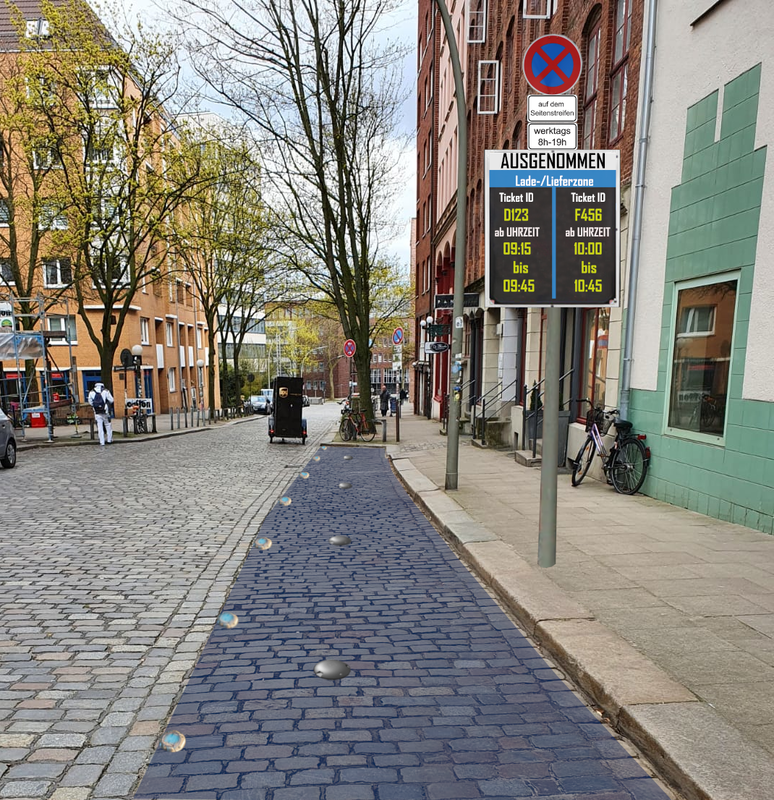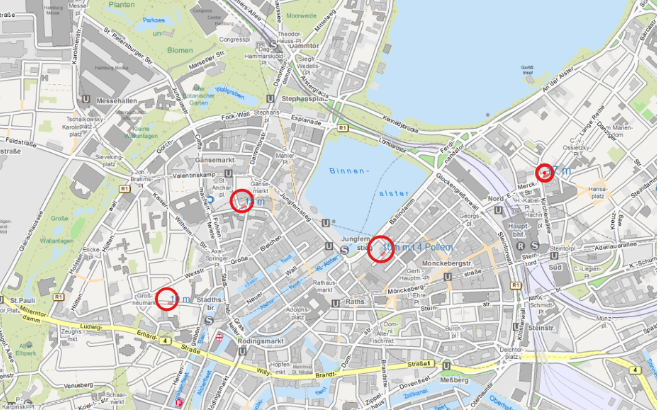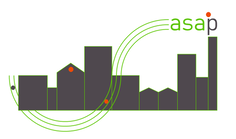Hamburg | Smart Loading Zones (SmaLa)
Description
Smart loading zones (SmaLa) - efficient loading zone management in Hamburg
Efforts are currently being intensified to ensure that delivery traffic in cities is conducted in an efficient and environmentally-friendly manner. New concepts for urban commercial traffic are being developed, especially against the background of the current and predicted enormous increase in online trade and the associated effects on delivery traffic.
A major problem is traffic caused by delivery vehicles double parking, which hampers the traffic flow. Among other things, large delivery vehicles occasionally block traffic signs or tempt other traffic participants into overtaking manoeuvres. This leads to an increased risk of accidents. In addition, persistent searching of parking space causes significant CO2 emissions.
Although there are already plenty designated loading and delivery zones in Hamburg that can be used for loading and unloading, the high misuse of the existing delivery and loading zones by other road users is one of the main reasons for double parking. KE Consult conducted a study in the city of Cologne in 2018 that revealed an 80% misuse rate of delivery and loading zones. Due to the comparable structures of Cologne and Hamburg, the misuse rate in Hamburg is also estimated at around 80%.
By setting up smart delivery and loading zones and developing a virtual booking system (incl. smartphone app), registered users can book a delivery zone in advance to ensure loading capacities in the desired time frame. This will reduce search traffic, double parking and environmental pollution (NOX and CO2).
The smart delivery and loading zones can be booked on demand. This may be in advance of the delivering tour or when already on the go. Delivery drivers can reserve the loading zones at the desired time when planning their route, minimizing the parking search traffic and double parking. As part of this initial pilot project, four model zones containing eight parking spaces will be equipped with a dynamic traffic sign. The sign will display the next booking, with information about the vehicle (booking ID) and time of booking. By using the booking ID law enforcement officers can identify if the parked vehicle has booked the respective slot and is therefore allowed to park. In addition, the zones are equipped with light dots that signal other road users the special nature of the zone and thereby potentially prevent its misuse. In order to provide information about the current status of availability, the smart loading zones are equipped with parking lot sensors.
The project launched in January 2020 and will run until the end of 2023. The project is divided into two major project phases. In the first phase, the four smart delivery and loading zones are available for testing by delivery service providers and suppliers since October 2021. In this model phase, the main objective is to find out how the concept can be used in practice and where changes or customizations are needed. After evaluating the first outcomes with the four model zones furthermore developments will be made in the second phase. Until the end of 2023, the smart loading zones will be expanded up to 25 areas and additional features will be added to the app. The project will result in an evaluation of the smart loading zones and a decision of incorporating them into the normal operation of loading zones in Hamburg.
(Source: Ministry of Economy and Innovation Hamburg)
Efforts are currently being intensified to ensure that delivery traffic in cities is conducted in an efficient and environmentally-friendly manner. New concepts for urban commercial traffic are being developed, especially against the background of the current and predicted enormous increase in online trade and the associated effects on delivery traffic.
A major problem is traffic caused by delivery vehicles double parking, which hampers the traffic flow. Among other things, large delivery vehicles occasionally block traffic signs or tempt other traffic participants into overtaking manoeuvres. This leads to an increased risk of accidents. In addition, persistent searching of parking space causes significant CO2 emissions.
Although there are already plenty designated loading and delivery zones in Hamburg that can be used for loading and unloading, the high misuse of the existing delivery and loading zones by other road users is one of the main reasons for double parking. KE Consult conducted a study in the city of Cologne in 2018 that revealed an 80% misuse rate of delivery and loading zones. Due to the comparable structures of Cologne and Hamburg, the misuse rate in Hamburg is also estimated at around 80%.
By setting up smart delivery and loading zones and developing a virtual booking system (incl. smartphone app), registered users can book a delivery zone in advance to ensure loading capacities in the desired time frame. This will reduce search traffic, double parking and environmental pollution (NOX and CO2).
The smart delivery and loading zones can be booked on demand. This may be in advance of the delivering tour or when already on the go. Delivery drivers can reserve the loading zones at the desired time when planning their route, minimizing the parking search traffic and double parking. As part of this initial pilot project, four model zones containing eight parking spaces will be equipped with a dynamic traffic sign. The sign will display the next booking, with information about the vehicle (booking ID) and time of booking. By using the booking ID law enforcement officers can identify if the parked vehicle has booked the respective slot and is therefore allowed to park. In addition, the zones are equipped with light dots that signal other road users the special nature of the zone and thereby potentially prevent its misuse. In order to provide information about the current status of availability, the smart loading zones are equipped with parking lot sensors.
The project launched in January 2020 and will run until the end of 2023. The project is divided into two major project phases. In the first phase, the four smart delivery and loading zones are available for testing by delivery service providers and suppliers since October 2021. In this model phase, the main objective is to find out how the concept can be used in practice and where changes or customizations are needed. After evaluating the first outcomes with the four model zones furthermore developments will be made in the second phase. Until the end of 2023, the smart loading zones will be expanded up to 25 areas and additional features will be added to the app. The project will result in an evaluation of the smart loading zones and a decision of incorporating them into the normal operation of loading zones in Hamburg.
(Source: Ministry of Economy and Innovation Hamburg)
Innovation and Relevance
The Smala-Project falls under the testbed category II of under-used resources. Through the set-up of the smart delivery and loading zones and a virtual booking system, users can ensure that they will have a loading zone available when needed. This will reduce search traffic, double parking and environmental pollution (NOX and CO2). The aspect of reserving public parking space for a specified use is a novelty in the national road traffic regulation.
Relation to other urban Logistics Projects
The project has been selected to be one of the anchor projects of the over 70 ITS-Projects (Intelligent Traffic and Transport Systems) which are taking place in connection with the ITS-World-Congress held in Hamburg in October 2021.
This testbed is an important component of Hamburgs municipal strategy to improve last mile logistics, as it will give insights on how to reduce parking search traffic as well as double parking, to increase traffic safety.
This testbed is an important component of Hamburgs municipal strategy to improve last mile logistics, as it will give insights on how to reduce parking search traffic as well as double parking, to increase traffic safety.
Plans for Future Development
The project is in phase one of two phases, where four model zones have been implemented and are currently tested. Phase two foresees the expansion of the smart loading zones into other parts of Hamburg as well as developing additional features for the virtual booking system. In the current phase, the user group is limited to CEP (Courier, Express and Parcel Services) delivery drivers. The user group of the loading zones will be widened to general commercial delivery drivers in the second phase of the project.
Impressions
Fotocredits: © ....




